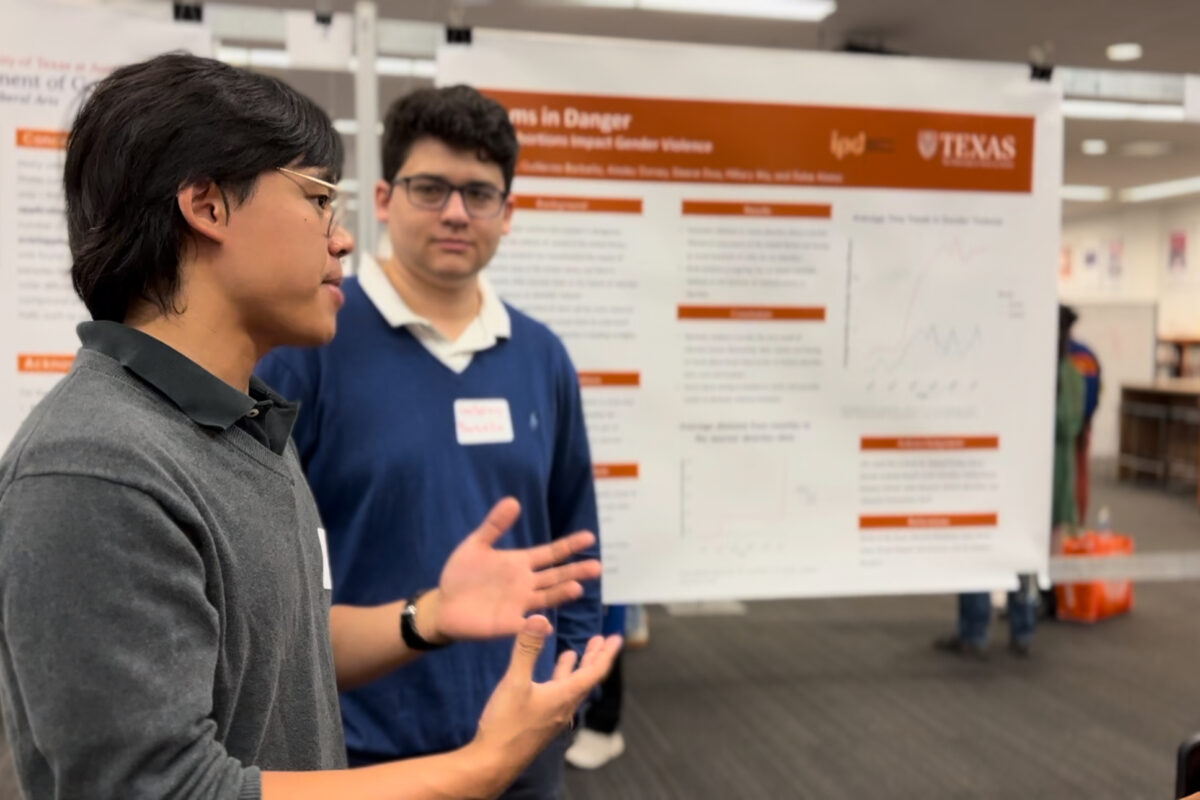When UT Austin history and government student Cassandra Cardenas started interviewing Fort Worth residents about their community needs during her summer internship through the Home to Texas program, she expected to hear familiar stories. After all, she had spent most of her life in the city. But to her surprise, she soon discovered that each conversation unveiled a hometown she had never known existed.
Working in the Fort Worth City Manager’s Office as an intern, Cardenas drafted press releases, conducted policy research, and uncovered the stories of community members — work that reshaped her view of both her city and her own history.
The collision of academic ambition with hometown reality that Cardenas experienced exemplifies how research opportunities at the undergraduate level enrich classroom learning while building technical competencies that are essential for roles in public service and civic leadership. Within the past few years, UT Austin’s College of Liberal Arts has developed a rich ecosystem of research opportunities that are rapidly reshaping how undergraduates engage with scholarly work.
Through NSF Research Experiences for Undergraduates (REU), students engage in funded research across disciplines, while Home to Texas, which supported Cardenas’ internship, connects first- and second-year students with hometown-based internships and research projects over their summer breaks. The college’s Undergraduate Research Apprenticeship Program (URAP) offers both group and individual research apprenticeships, providing course credit and stipends to participants. And throughout the college, individual departments offer opportunities to engage in research with faculty. For example, Innovations for Peace and Development and the Texas Archeological Laboratory, among many others, offer research experiences. Together, these programs combine university resources with hands-on student engagement to empower the next generation of innovators with creativity and purpose.
The results speak volumes: students who participate in these programs and experiences routinely secure research funding, present at conferences, and publish their findings alongside faculty mentors. Their success demonstrates how combining a top research university’s resources with dedicated undergraduate engagement creates graduates ready to tackle complex challenges in any field.
“The data consistently show that research engagement creates these rewarding feedback loops in student development,” notes Robert Crosnoe, senior associate dean for research in the College of Liberal Arts. “Students who participate in research projects build skills and develop new ways of understanding social systems and institutional processes. It’s a form of situated learning that transforms their relationship with knowledge production.”
In a strategic move to further advance the college’s research portfolio, COLA Dean Ann Huff Stevens appointed Becky Pettit, professor of sociology, as Special Advisor to the Dean on Undergraduate Research in 2024. Pettit, whose research on mass incarceration and social inequality has influenced policy discussions at the highest levels, brings both scholarly rigor and a proven dedication to mentorship to this role. Her recent leadership of the “Fines, Fees, and Community Service” research partnership with the Home to Texas program typifies a research approach that merges active knowledge creation in a real-world setting with academic expertise, guiding dozens of undergraduates in collecting original data about judicial practices across Texas communities.
“Conducting research in their hometowns was a transformative experience for students,” says Pettit. “By investigating real issues in their own communities, they develop skills that bridge academic rigor with practical impact — exactly the combination we aim to foster in liberal arts education.”
“Fines, Fees, and Community Service” supported 67 Home to Texas students to conduct interviews with local judges as part of the overall research project, and nine of the students held full-time research internships organized by UT’s Initiative for Law, Societies and Justice.
Since its introduction in the fall of 2021, the URAP program has also conducted research embedded in communities that ultimately produced knowledge to benefit those communities. For example, when students in the program documented judicial practices across Texas, their findings provided valuable data for policymakers considering reforms. Similarly, student research on domestic violence patterns during COVID-19 contributed to policymakers’ understanding of crisis response needs. Undergraduate researchers don’t just consume knowledge — they create it by joining a larger community of scholars working to solve pressing social problems.
“There were a lot of great research opportunities in the college before URAP, but they weren’t as coordinated as we wanted,” says Stevens. “By organizing and raising the visibility of student research programming, we’ve been able to scale up participation and provide opportunities for students interested in research engagement to learn with and from each other.”
The impact of these experiences resonates through student testimonials. “It was inspiring to see how research could directly shape policies and drive meaningful change within communities,” says Neel Youts, a senior who analyzed domestic violence rates during the COVID-19 pandemic. For Diana Garcia, a sophomore government major who was initially “very against coding,” her URAP project on crime and justice transformed her perspective, inspiring future research aspirations. Lauren Dulac, a third-year history major, found the sweet spot between independence and mentorship while investigating World War II in North Africa. “It’s been really fun to have the academic freedom while also having people who you can talk to and who can guide you through the process,” she says.
“Research involvement is another element of career preparation for COLA students,” says Stevens. “The philosophy of career preparation in COLA is that both curricular and extra-curricular experiences prepare students for a wide range of career options. By providing structured research opportunities for students, we give them the chance to learn and implement project management skills, technical skills, communication skills, and more, outside of — but closely related to — the traditional classroom experience.”
Thanks to their undergraduate research experiences in COLA, today’s undergraduates aren’t just preparing for careers — they’re already living them. When Cardenas returned to campus from her research experience in the Fort Worth City Manager’s Office, she brought back more than data and policy insights. She carried the real-world skills that define successful professionals: the ability to listen deeply, analyze systematically, and translate complex findings into outcomes.
